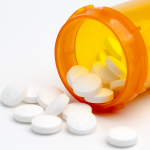
When patients think about possible causes for their dental disease, their first thoughts often go to their oral hygiene practices. While it’s true that good brushing and flossing habits are essential for maintaining optimal dental health, other factors can lead to dental disease despite patients’ best efforts to take care of their teeth. One such condition is dry mouth (xerostomia).
It’s hard to overstate the importance of saliva for maintaining good oral health. Saliva helps to remove decay-causing food particles from around the teeth, and it helps neutralize acids that can erode enamel. Its antimicrobial properties kill bacteria that can lead to the formation of plaque. And the minerals in saliva, such as calcium, fluoride, and phosphate, help to rebuild the enamel of your teeth. When a patient suffers from dry mouth, the lack of saliva can quickly lead to gum disease, tooth decay, and oral infections.
One of the most frequent causes of dry mouth is taking medication. Unfortunately, dry mouth is a side effect of hundreds of both prescription and over-the-counter medications, from amoxicillin to Zyrtec. The list even includes medications as common as acetaminophen and ibuprofen. Types of medications that can cause dry mouth include antibiotics, antihistamines, blood pressure medicines, bronchodilators, diuretics, muscle relaxers, pain medications, and more. The problem may be exacerbated if patients are taking more than one type of medication with this side effect.
If you have persistent dry mouth, it’s essential to address the problem quickly to avoid dental problems. First, consult with your doctor and your dentist to identify the cause of your dry mouth. Should a medication or medications you are taking be responsible for your condition, it may be possible to eliminate the problem entirely by substituting a medication that does not cause dry mouth. If not, these professionals can advise you on steps to take to alleviate the severity of your dry mouth, such as chewing sugarless gum to stimulate the flow of saliva, sipping water frequently, limiting caffeine intake, using over-the-counter saliva substitutes, and using a humidifier at night, which may help prevent damage to your teeth. In addition, your dentist may be able to suggest treatments to maintain your oral health, such as sealants to protect against decay or in-office fluoride treatments to strengthen teeth.
If your dry mouth has already caused extensive damage, you should also consult an experienced oral surgeon for the best options for dealing with missing or failing teeth. Advances in implant techniques have made the process quicker and more affordable than in the past, minimizing the number of procedures necessary for patients to obtain beautiful, fully functional replacement teeth. To schedule a consultation with Dr. Hale, please call 888-326-1579 or fill out our online form below.